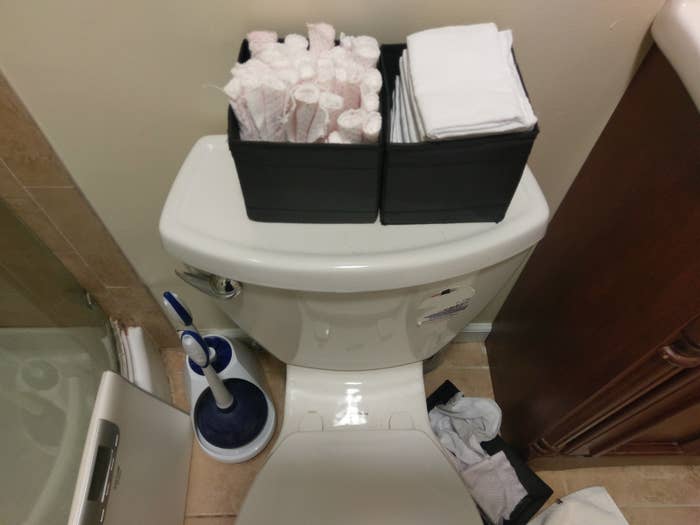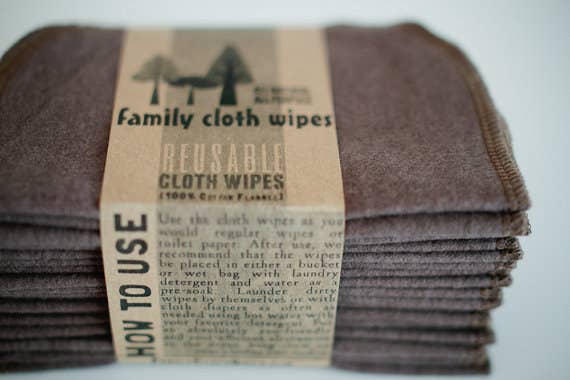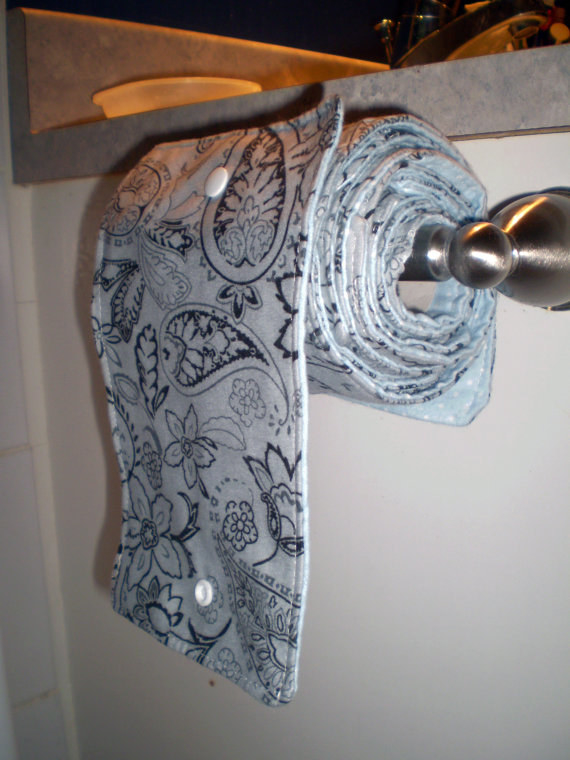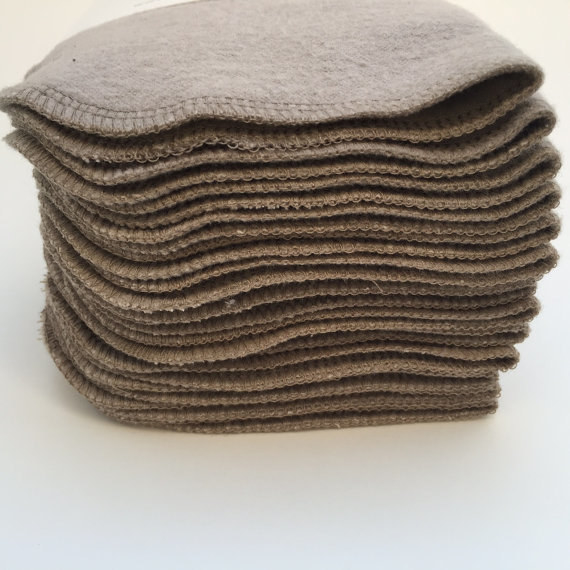If you're not already familiar with the concept of a family cloth, it's pretty simple: It's a cost-effective, eco-friendly system in which you wipe with cloth wipes instead of toilet paper, and then wash and reuse them for as long as they last.

Proponents like it because it's cheap (one set of cloths can last you a long time) and they say it's very enjoyable for your bottom, too. But as simple as it sounds, the very idea of it often gets people very riled up. To find out more about what it's like to use them every day, I asked a dedicated family cloth user (who asked to remain anonymous) to share her experience.
Here, in her own words, is a snapshot of life using a family cloth.
On getting started:
"My family is myself and my husband, my 6-and-a-half-year-old daughter, and my 3-year-old son. To be honest, I was the main driving force behind this switch from toilet paper to a family cloth. We've been using family cloth for under a year, even though the plan to do so had been years in the making for us. So far, it's been wonderful and I can't imagine going back. We often hear metaphorical talk like 'Buying ________ is like flushing money down the toilet.' But in my mind, buying and using disposable toilet paper was literally flushing money down the toilet! If you’re wondering, 'Why would you want to reuse something that you wipe your genitals with?', I’d answer this question with my own question: 'Do you throw away your underpants after each use?'
"Let's also set the record straight: Individuals who use family cloth do not only have *a* single piece of cloth. We have dozens of smallish strips of cloth. Each visit to the toilet gets its own cloth. In each bathroom of our home, there is a container of many clean cloths on top of the tank and a small bin on the floor that we use as a hamper. After each 'go,' we take one cloth, use it, and drop it in the hamper."

On poop:
"At the moment, we don’t use the cloths for poop; they're just for pee. We use baby wipes because toilet paper just doesn't get the tushy clean enough, but we never flush wipes because it clogs the pipes. The ultimate goal is to attach bidets to our toilets, and then use that to cleanse after a poop and then, yes, to use the cloths to pat dry. I have no problem with some cloths sitting for a day in a hamper that have some pee on them, but I would definitely not want cloths with big smears of poop sitting around and going into the washer. That's my limit. So the bidet is necessary because that does the cleaning. Then, the cloths are just for drying that water off. This, however, will take a bit more money, and probably a little bit of convincing, coaxing, and coaching with my kids."
[Editor's note: Some families definitely do use it for poop. One blogger who does writes, "I find it so much more comfortable and luxurious feeling. I feel cleaner. I also use it for ‘that time of the month’ which is extra-awesome. We ladies tend to feel icky in those days because it’s tough to get totally clean with just paper. With a warm, wet cloth, I feel like I’m actually getting 100% clean. Full disclosure: sometimes I tag team it and use a bit of paper to wipe first, then a wet cloth for a more thorough clean." Another one advises using a spray bottle to clean your butt first before wiping with the cloth after doing #2.]
On disposal:
"For the in-bathroom hampers, we are currently using the middle-sized Skubb fabric bins from Ikea. For the clean ones, we use the small-sized Skubb, simply because that's what we already had available. I think ideally, we'd have something wicker or plastic, but I'm certainly not going to buy something new when we already have something that works just fine. The Skubbs are made of a fabric that is easily wiped clean.
"When people say, 'So, you just have piss rags laying around?' the answer is...yep. But not really. They stay corralled in a hamper for maybe a day at a time and then I empty them into the main hamper and then they're in the washing machine about twice a week. But my bathroom doesn't smell bad. It doesn't smell like a public toilet. It smells like my husband's beard balm."
On having guests:
"People often ask, 'Do you have something else that I can use when I come visit?' The answer is always yes, although they should feel welcome to use the cloth if they’re so inclined. We always keep a box of facial tissues in the bathroom cabinet for guests. Some of our close friends and family already know that and just grab it when they wanna go. Some of our friends and family just use our cloth because why not?! But when we know ahead of time that people are coming over, we just get the box of tissues out and set it on the sink vanity."
On fabrics:
"Some families use old T-shirts or pajamas to make their family cloth. We happened to not have enough of those. Plus, I specifically wanted white cloths so I could throw them in the wash with all our other white linens (bath linens, kitchen linens, bed linens etc.), which I wash on the hot setting and I add bleach. So I went to the fabric store and found white flannel with teeny pastel dots. I bought a yard of white with green dots, a yard of white with blue dots, and a yard of white with pink dots. Just for some cute whimsy. My daughter loves the little pattern. Once I had cut all the cloths and taken the toilet paper out of the bathrooms, it was a pretty easy adjustment.
"With paper, which will always be more immediately absorbent than cloth, I basically would just take a few squares, bunch them up, pat and wipe gently for literally one second, and be done. With the cloth, I did have to change the way I dried myself off after a pee. I learned to fold the cloth in half — effectively making it two-ply flannel — and pat once and hold for a few seconds to give the cloth time to absorb. Not a huge learning curve. It works great!"

On laundry:
"I do laundry at least once a week, but usually twice. We've always separated lights and colors so that we can do whites on hot with bleach and colors on a lower temperature setting, so it hasn't really affected our laundry routines at all. Even a week's worth of cloth doesn't add much volume to the load of laundry, so we don't need to do it more often than we did. We also haven't needed to change our detergent because we usually just go for something super simple, and we've never used fabric softener anyway. (Fabric softener, by the way, is a big no-no for any effective cloth reusables because it basically takes away the absorbency of any fabric.)
"Though I do not have bigger loads of laundry to do as a result of using family cloth, nor do I need to do laundry more often, the folding process does take a bit longer. This, however, varies from family to family. I roll the cloths. It's time-consuming and a bit monotonous, sure, but I personally just don't mind. I fold laundry while I'm listening to NPR so a few more minutes doesn't bother me. Other families dispense with folding them altogether and just put them into a bin as they come out of the dryer or off the clothesline. You just gotta find what makes it work for you."
On staining:
"A stain does not indicate filth. It’s simply a discoloration caused when a substance containing intense pigmentation comes into contact with certain materials, like the natural fibers found in cloth. Modernity has coddled us into thinking that everything should be spotless and perfect, and, when marred, should be tossed and replaced. This mindset is part of what has gotten us into our current sad state of affairs, ecologically speaking. If my cloths get stained by menstrual blood and come out of the hot-water-with-bleach wash with reddish or brownish areas of discoloration, I honestly do not care and neither should you. We can all grow up and let go of our learned squeamishness for the sake of taking better care of our planet, our only home."
On living an eco-conscious lifestyle:
"Over the years, I've developed a real distaste for single-use items, both because of the economical reasoning and also because it started to feel really disrespectful of our planet's resources. We compost food scraps, we recycle carefully and thoroughly. We only own one car (in the suburbs, we're learning this is apparently freakish behavior) and walk or take public transportation as often as possible. We avoid disposable items and try to buy certain things secondhand. I mend and repair when I can so we don't have to buy replacements for socks and things like that. We make food from scratch as much as possible. We don't eat meat or poultry, and try to base our menus as much around a plant-based diet as possible (though we're not vegan). We participate in freecycling, micro gift economies, and curb scavenging. I'm sure there's more we do, but that's all I can think of right now.
"Using a family cloth was just the next logical step in our family's efforts to conserve and reduce our carbon footprint. For as long as it was in my sphere of awareness, I was always curious and interested in the concept and practice of using cloth instead of toilet paper. I think I had a bit of anxiety about it; I wasn’t completely confident that I could do this in a sanitary way. But after joining zero-waste Facebook groups and becoming involved there, I encountered lots of other people already doing it and their successes bolstered my resolve and motivation.
"Before this year, we'd been living in rented apartments and doing laundry either in facilities shared by all residents of the building, or at neighborhood laundromats. We had considered doing cloth diapering when our kids were babies, but never felt comfortable bringing that kind of stuff to shared or public facilities. But this past summer, we bought a house and now we do laundry in our own basement. This shift was basically the green light I'd been waiting for."

Other benefits:
"Having one less thing to spend money on is pretty great. It helps me to feel more self-sufficient and in-control when it comes to taking care of my family. The more I can make and fix myself, the better. I started darning my family's socks when they'd wear thin just to avoid buying new ones. It's not being cheap, it's being thrifty and resourceful. I feel good when I can do things myself instead of having to go out and buy or outsource my family's needs.
"Don't let the term 'family cloth' turn you off. I'm actually not even sure why it's called that. If you are single, reusable cloth personal wipes are for you. If you have 13 kids, reusable cloth personal wipes are for you. No matter your relationship status, your sex or gender identity, your political affiliation, tax bracket, ethnicity, or religion, reusable cloth personal wipes are delightful and they are for you.
"I'm an admin of a Facebook group dedicated to the reduction of wastefulness and pollution. The people in this group are often die-hard 'zero-wasters' and even I get flack sometimes for how I do things. Some people get upset that I use bleach, or that I don't make my own detergent. Some people get on my case for still using wipes for poop or for using a dryer instead of line drying — I actually do line-dry some things, just not all things — or any number of other things they think I'm doing wrong. As we are all concerned with each doing our own part in reducing our carbon footprints and healing the environment, we have to each find our own way. We should be doing our research before making big decisions, but also basing our efforts on what we are able to do.
"Someone who has a demanding, full-time job, though, might not feel up to the whole family cloth endeavor. But what can that person do? Buy toilet paper that's wrapped in paper instead of plastic. Does the thought of cloth dish rags gross you out too much? Then use paper towels, but think before tossing the cardboard core into the recycling bin — is there a local elementary school that would love to get this cardboard tube for an art project? The answer is almost certainly yes. The people who will flame you for making an effort in your own way to help the planet probably have trouble seeing the gray area and appreciating nuances. Do you; just remember to do you with the planet in mind as well."
